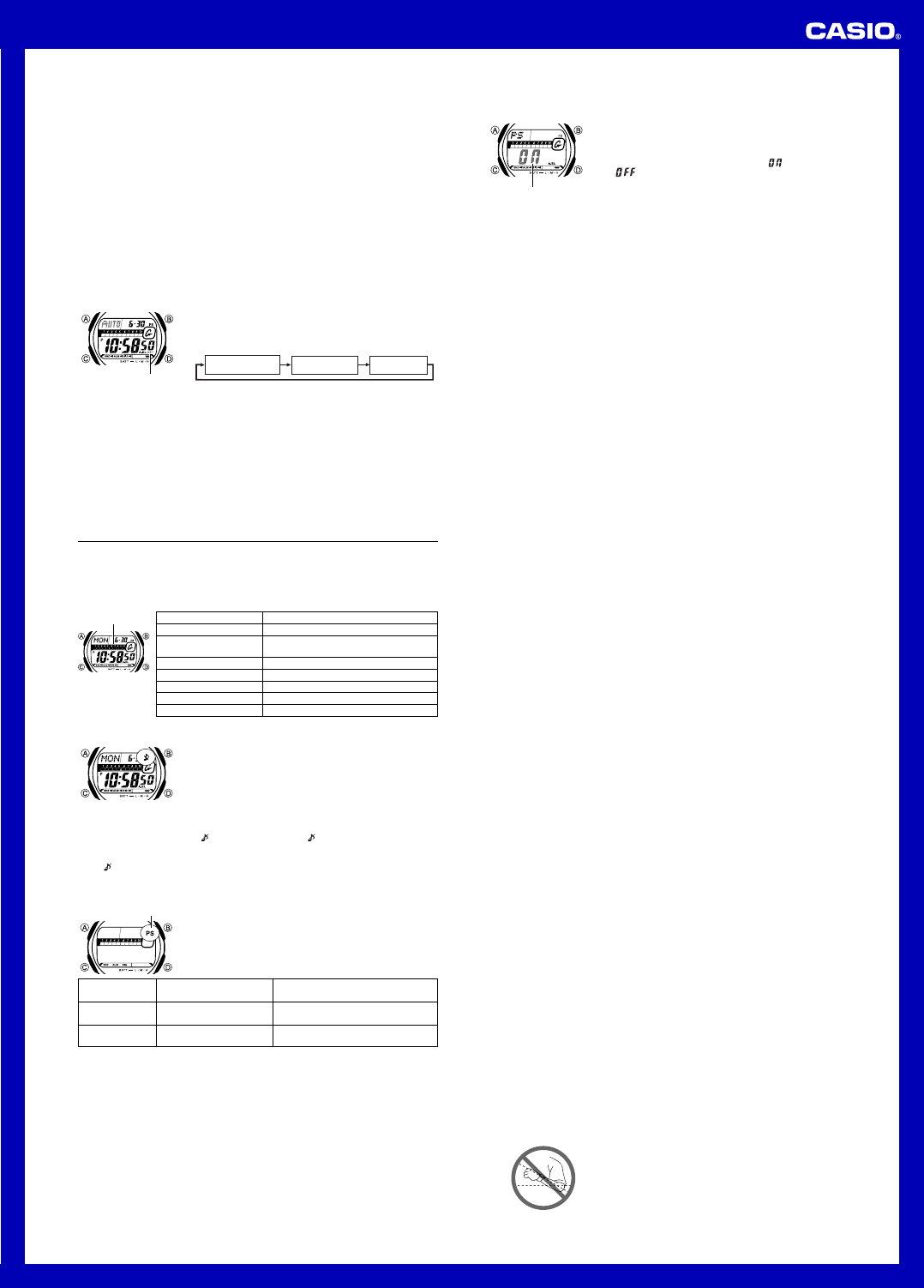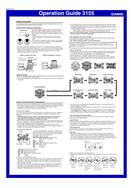
Operation Guide 3155
7
Daylight Saving Time (DST)
Daylight Saving Time (summer time) advances the time setting by one hour from
Standard Time. Remember that not all countries or even local areas use Daylight
Saving Time.
The time calibration signals transmitted from Mainflingen (Germany), Anthorn
(England), or Fort Collins (the United States) include both Standard Time and DST
data. When the Auto DST setting is turned on, the watch switches between Standard
Time and DST (summer time) automatically in accordance with the signals.
• Though the time calibration signal transmitted by the Fukushima and Fukuoka/Saga,
Japan transmitters include summer time data, summer time currently is not
implemented in Japan (as of 2007).
• The default DST setting is Auto DST (
AvtA) whenever you select LIS, LON,
MAD, PAR, ROM, BER, STO, ATH, MOW, TYO, ANC, YVR, LAX, YEA,
DEN, MEX, CHI, MIA, YTO, NYC, YHZ, or YYT as your Home City code.
• If you experience problems receiving the time calibration signal in your area, it
probably is best to switch between Standard Time and Daylight Saving Time
(summer time) manually.
To change the Daylight Saving Time (summer time) setting
1.In the Timekeeping Mode, hold down A until the city
code starts to flash, which indicates the setting screen.
2.Press C and the DST setting screen appears.
3.Use D to cycle through the DST settings in the
sequence shown below.
Auto DST (
AvtA
) DST off (
OFF
) DST on (
ON
)
• If you change your Home City to one that is within the same transmitter area, the
current DST setting will be retained. If you change to a city that is outside your
current transmitter area, DST will be turned off automatically.
Transmitter area city codes
•
TYO, TPE, and SEL
• HKG, BJS
• HNL, ANC, LAX, DEN, CHI, NYC, YVR, YEA, MEX, MIA, YTO,
YHZ, and YYT
• LON, PAR, BER, ATH, LIS, MAD, ROM, STO, and MOW
• All other city codes
l
l
l
l
l
l
l
l
l
l
l
l
l
l
l
l
l
l
l
l
l
l
l
l
l
DST indicator
4. When the setting you want is selected, press A to exit the setting screen.
• The DST indicator appears to indicate that Daylight Saving Time is turned on.
Reference
This section contains more detailed and technical information about watch operation.
It also contains important precautions and notes about the various features and
functions of this watch.
Graphic Area
The information shown in the graphic area depends on the current mode.
Mode
Timekeeping Mode
Rally Mode
Recall Mode
World Time Mode
Alarm Mode
Stopwatch Mode
CountdownTimer Mode
Graphic Area
Timekeeping Mode seconds
Target time number/Measurement time
1/10 seconds during measurement
Record number
Timekeeping Mode seconds
No indication
Stopwatch Mode 1/10 seconds
CountdownTimer Mode seconds
Graphic Area
Button Operation Tone
The button operation tone sounds any time you press one
of the watch’s buttons. You can turn the button operation
tone on or off as desired.
• Even if you turn off the button operation tone, the
alarms, the Hourly Time Signal, the countdown alarm,
and Rally Mode auto start all operate normally.
To turn the button operation tone on and off
In any mode (except when a setting screen is on the display), hold down C to toggle
the button operation tone on (
not displayed) and off ( displayed).
• Holding down C to turn the button operation tone on or off also causes the watch’s
current mode to change.
• The
indicator is displayed in all modes when the button operation tone is turned
off.
Power Saving Function
When turned on, the Power Saving function enters a sleep
state automatically whenever the watch is left in an area
for a certain period where it is dark. The table below
shows how watch functions are affected by the Power
Saving function.
• Wearing the watch inside the sleeve of clothing can cause it to enter the sleep state.
• The watch will not enter the sleep state between 6:00 AM and 9:59 PM. If the watch
is already in the sleep state when 6:00 AM arrives, however, it will remain in the
sleep state.
Power saving indicator
Elapsed Time in
Dark
60 to 70 minutes
6 or 7 days
Display
Blank, with Power Saving
indicator (PS) flashing
Blank, with Power Saving
indicator (PS) not flashing
Operation
All functions enabled, except for the
display
Auto receive, beeper tone,
illumination, and display are disabled.
To recover from the sleep state
Perform any one of the following operations.
• Move the watch to a well-lit area.
• Press any button.
• Angle the watch towards your face for reading.
To turn Power Saving on and off
1.In the Timekeeping Mode, hold down A until the city
code starts to flash, which indicates the setting screen.
2.Press C nine times until the Power Saving on/off
screen appears.
3.Press D to toggle Power Saving on (
) and off
(
).
4.Press A to exit the setting screen.
• The Power Saving indicator (PS) is on the display in all
modes while Power Saving is turned on.
l
l
l
l
l
l
l
l
l
l
l
l
l
l
l
l
l
l
l
l
l
l
l
l
l
l
l
l
On/Off status
Radio-controlled Atomic Timekeeping Precautions
• Strong electrostatic charge can result in the wrong time being set.
• The time calibration signal bounces off the ionosphere. Because of this, such factors
as changes in the reflectivity of the ionosphere, as well as movement of the
ionosphere to higher altitudes due to seasonal atmospheric changes or the time of
day may change the reception range of the signal and make reception temporarily
impossible.
• Even if the time calibration signal is received properly, certain conditions can cause
the time setting to be off by up to one second.
• The current time setting in accordance with the time calibration signal takes priority
over any time settings you make manually.
• The watch is designed to update the date and day of the week automatically for the
period January 1, 2000 to December 31, 2099. Setting of the date by the time
calibration signal cannot be performed starting from January 1, 2100.
• This watch can receive signals that differentiate between leap years and non-leap
years.
• Though this watch is designed to receive both time data (hour, minutes, seconds)
and date data (year, month, day), certain signal conditions can limit reception to time
data only.
• If you are in an area where proper time calibration signal reception is impossible, the
watch keeps time within ±15 seconds a month at normal temperature.
• If you have problems with proper time calibration signal reception or if the time
setting is wrong after signal reception, check your current city code, DST (summer
time), and auto receive settings.
• The Home City setting reverts to the initial default of
TYO (Tokyo) whenever the
battery power level drops to Level 5 or when you have the rechargeable battery
replaced. If this happens, change the Home City to the setting you want.
Transmitters
The time calibration signal received by this watch depends on the currently
selected Home City code.
• When a U.S. time zone is selected, the watch receives the time calibration signal
transmitted from the United States (Fort Collins).
• When a Japanese time zone is selected, the watch receives the time calibration
signal transmitted from Japan (Fukushima and Fukuoka/Saga).
• When a European time zone is selected, the watch receives the time calibration
signals transmitted from Germany (Mainflingen) and England (Anthorn).
• When a China time zone is selected, the watch receives the time calibration signals
transmitted from China (Shangqiu City).
• When your Home City is LIS, LON, MAD, PAR , ROM, BER, STO, ATH, MOW
(which can receive both the Anthorn and Mainflingen signals), the watch first tries to
pick up the signal it last successfully received. If that fails, it tries the other signal. For
the first receive after you select your Home City, the watch tries the nearest signal
first (Anthorn for LIS, LON, Mainflingen for MAD, PAR, ROM, BER, STO, ATH, and
MOW).
Auto Return Features
• If you leave a screen with flashing digits on the display for two or three minutes
without performing any operation, the watch exits the setting screen automatically.
Scrolling
The B and D buttons are used in various modes and setting screens to scroll
through data on the display. In most cases, holding down these buttons during a scroll
operation scrolls at high speed.
Initial Screens
When you enter the Rally Mode, Recall Mode, World Time Mode, or Alarm Mode, the
data you were viewing when you last exited the mode appears first.
Timekeeping
• Resetting the seconds to 00 while the current count is in the range of 30 to 59
causes the minutes to be increased by 1. In the range of 00 to 29, the seconds are
reset to 00 without changing the minutes.
• The year can be set in the range of 2000 to 2099.
• The watch’s built-in full automatic calendar makes allowances for different month
lengths and leap years. Once you set the date, there should be no reason to change
it except after you have the watch’s battery replaced.
• The current time for all city codes in the Timekeeping Mode and World Time Mode is
calculated in accordance with the Coordinated Universal Time (UTC) for each city,
based on your Home City time setting.
World Time
• The seconds count of the World Time is synchronized with the seconds count of the
Timekeeping Mode.
Illumination Precautions
• The electro-luminescent panel that provides illumination loses power after very long
use.
• Illumination may be hard to see when viewed under direct sunlight.
• The watch may emit an audible sound whenever the display is illuminated. This is
due to vibration of the EL panel used for illumination, and does not indicate
malfunction.
• Illumination turns off automatically whenever an alarm sounds.
• Frequent use of illumination runs down the battery.
Auto light switch precautions
• Avoid wearing the watch on the inside of your wrist. Doing so causes the auto light
switch to operate when it is not needed, which shortens battery life. If you want to
wear the watch on the inside of your wrist, turn off the auto light switch feature.
• Illumination may not turn on if the face of the watch is
more than 15 degrees above or below parallel. Make
sure that the back of your hand is parallel to the ground.
• Illumination turns off after a preset amount of time (1.5
or 3 seconds), even if you keep the watch pointed
towards your face.
More than 15 degrees
too high
























